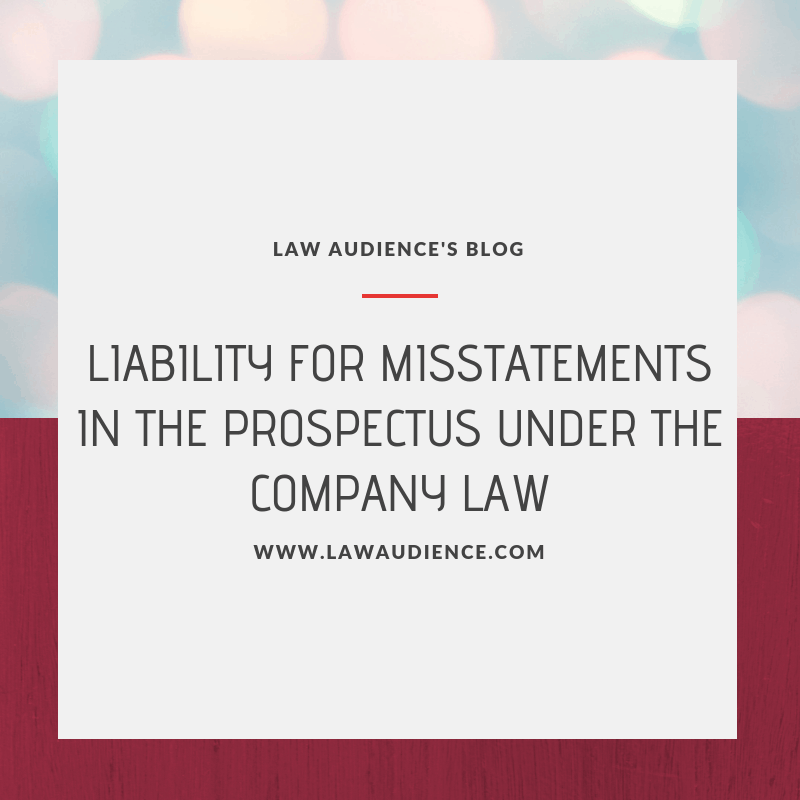AUTHORED BY: MS. NATASHA JAIN, LL.B, STUDENT AT NEW LAW COLLEGE, BHARATI VIDYAPEETH DEEMED UNIVERSITY & RESEARCH WRITER AT LAW AUDIENCE: EDITED BY: MS. SAKSHI SONKER, 4TH YEAR STUDENT, RAJIV GANDHI NATIONAL UNIVERSITY OF LAW, PUNJAB & ASSISTANT EDITOR AT LAW AUDIENCE.
I. INTRODUCTION:
The prospectus is the whole and sole of every company. The common people only on the base of the prospectus contents think either they want to invest in that very company or not. That’s why the proclamations which are mentioned in the prospectus needs to be completely true. The main purpose of the company of issuing the prospectus is that they want people to come and take stocks or debentures of the company or to credit money through the company. It is the responsibility of the company to check whether the statements which are stated in the prospectus are true or false. In case, there are any incorrect information is mentioned in the prospectus and the public performances upon that then there are provisions given under the Companies Act for the people who are responsible for confusing the public.
II. MEANING OF PROSPECTUS:
The meaning of prospectus which is given under the Indian Companies Act, 1956 was constructed on the meaning established in the English Companies Act. “A prospectus means any document described or issued as a prospectus and includes any notice, circular, advertisement or other document inviting deposits from the public or inviting offers from the public for the subscription or purchase of any shares in or debentures of a body corporate”. Henceforth, any commercial that proposes to offer any stocks or debentures of the company to the public for sale is known as a prospectus.
III. CONTENTS OF PROSPECTUS:
The prospectus is one of the resources by which one can find out the reliability of the company’s scheme. This is the elementary purpose of the prospectus. It is the responsibility of a company to see that whatever is stated in the prospectus is of true nature. Certain prerequisites which are required for making the prospectus are: –
- Prospectus needs to date: Through this one can easily get to know about the publication date.
- The prospectus should be registered: The prospectus needs to be registered by the Registrar of Companies and it should be signed by each and every person whose name is mentioned whether a director or a proposed director of the company under the prospectus. It helps as a record of the terms and conditions of the investment matter.
- Consent of the Experts: Experts approval requisite to be acquired in written and it must be mentioned in the prospectus supposed to be made by the expert.
- Revelations in the prospectus: According to Section 56 of the Act – All prospectuses are mandatory to unveil the matters stated in Schedule II of the Act.
IV. TYPES OF PROSPECTUS:
a) SHELF PROSPECTUS:
Section 60 (A) of the Companies Act, defines Shelf Prospectus. Any public financial organization, public sector bank whose foremost purpose is funding then it is obligatory for them to file a shelf prospectus. Shelf prospectus is a prospectus which is delivered by any funding organization or bank for one or more issues of the securities or class of securities stated in that very prospectus. The company who has already filed the shelf prospectus with the Registrar has a benefit that they need not to file a fresh prospectus at each stage of the offer of securities in a period of the legitimacy of such shelf prospectus.
b) INFORMATION MEMORANDUM AND RED-HERRING PROSPECTUS:
A public company creating a matter of securities could circulate memorandum of information to the public earlier to the filing of a prospectus. The definition of Information Memorandum has been given in Section 2 (19-B) through the Amendment Act, 2000. “Information Memorandum means a process undertaken prior to the filing of a prospectus by which a demand for the securities proposed to be issued by a company is elicited, and the price and the terms of the issue for such securities are assessed by means of a notice, circular, advertisement or document.” Red-Herring Prospectus is a prospectus which does not have complete particulars on the price of the securities offered and the quantum of securities offered.
c) DEEMED PROSPECTUS:
The conception of the deemed prospectus is given under Section 64 of the Act. It is an exclusion to the issue of the prospectus. The sense of duty of making and filling of a prospectus is very difficult and the requirements related to the prospectus are most rigorous, a company can avoid this by giving the entire money to an intermediate acknowledged as an “Issuing House”. Then the shares are presented to the public by the “House” through the announcement.
V. MISSTATEMENT:
According to Section- 65, a declaration comprised in a prospectus will be considered false if the declaration is comprised in the deceptive method and situation. A prospectus is said to be false if in order to misinform there is any error of matter is made in the prospectus. A proclamation can be believed to be misinformed not only in the prospectus but as well even if it is existed in whichever report or document by reference merged within or issued therewith. If a person has suffered any loss or damage who has on the trust of the prospectus contributes for any shares or debentures then the obligation accumulates.
VI. LIABILITY FOR MISSTATEMENT
a) CIVIL LIABILITY FOR MISSTATEMENT:
Section- 62 of the Companies Act deals with the civil liability and it makes a certain person responsible to pay reimbursement to every single individual who contributes for any shares or debentures and could have grieved any cost or damage on the belief of the prospectus in which statements made are false in nature. It also takes account of Directors of the Company, Promoters, or even the company. Therefore, the cases of misstatements of truths in a prospectus are dealt with in this Section. If the Director permits the issue of the prospectus then he is liable no matter if he has seen the prospectus or not. The provision of this Section is to safeguard the privileges of every cheated shareholder who act on behalf of the untrue statements mentioned in the prospectus.
Conditions for invoking Section 62:
- A prospectus has been issued by a company for welcoming persons for subscribing its shares or debentures.
- A false statement was mentioned in the prospectus.
- A person who has subscribed for the shares and debentures because of the prospectus can only claim.
- Such a person has subscribed because of the false statement mentioned in the prospectus.
- Due to this, a person has suffered loss or damage.
b) CRIMINAL LIABILITY:
Section 63 deals with the provisions of criminal liability for misstatement in the prospectus. According to Section 62, every single person who has approved the issue of the prospectus which is false in nature shall be liable for punishment of imprisonment for a term which may extend to two years or with fine which may extend to fifty thousand rupees or both.
VII. CONCLUSION:
It is the main duty of every single person who is sanctioning the issue of a prospectus to check that the statements made in the prospectus are of true nature and does not give any deceitful representation to the public. Section 62 makes certain people responsible to pay reimbursement to every individual who has suffered loss or damage while believing the prospectus and subscribing the shares or debentures. If any mistake is committed to the shareholders by the company or any other person who is working for the company will be held liable. Henceforth, it is said that no one is above the law and law leaves no single person if any mistake is ascertained against them.



